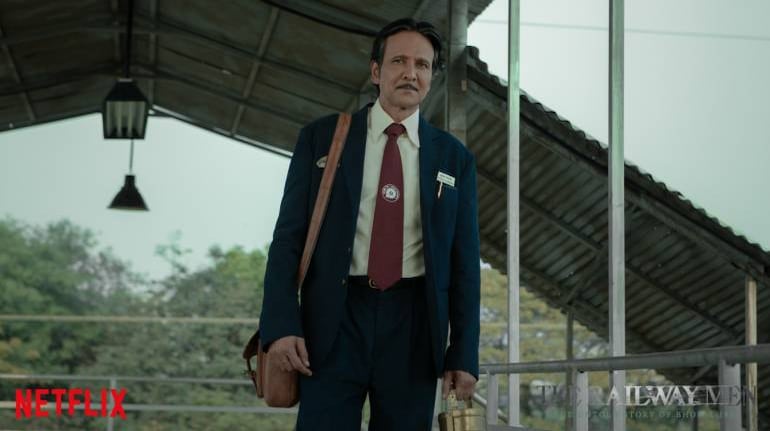
There are at least half-a-dozen images in Netflix’s The Railway Men that might make the insides of your brain howl. The kind of howl only sore, raw readings of tragedy can extract from reflexes that have been dulled to the sight and sense of loss. We have been raised to accommodate disaster. People die in in our newsbreaks, in our third-page headlines, in front of our eyes, even with a sort of procedural regularity which dehumanises the very act of perishing from this planet. To that context, the Bhopal Gas Tragedy is a pivotal moment in this country’s modern history. An inflection point so surreal, so critical to the nation’s understanding of collective loss, that any attempt to revisit or recreate it comes with the burden of doing ‘justice’, in the form of creative hindsight. To which effect, The Railway Men is enthralling, shattering and moving in ways that few shows on Indian streaming might ever be.
This four-episode limited series condenses events of that fateful night of December 1984 into things as they transpired at the Bhopal Junction railway station. More than condense, it’s the lens of public service which becomes our method of viewing a man-made catastrophe as it unfolds, in meticulously detailed iterations. On the eve of the gas leak, people go about their normal lives in the vicinity of the Union Carbide plant. The warning signs were there, as we now know, and so was the disinclination to do anything about them. “I don’t want any alarms until someone is dying, or is dead,” a grumpy, white-skinned manager of the factory yells to his junior. We know what will happen, a vague idea of how it might play out, but no sense of the commotion and hysteria that this series’ acute focus and pithy treatment will put us through.
Kay Kay Menon plays Iftekaar Siddiqui, the traumatised but righteous stationmaster of Bhopal Junction. On the eve of the tragedy, Siddiqui tends to his usual tasks, overseeing the running of a compact but fairly chaotic station. He is joined in his pursuit of control and order by new recruit Imad Riaz, played by an excellent Babil Khan. Divyenndu Sharma plays a disgruntled, corrupt officer, circling the same area with an air of menace. The three men become the centre of an unfolding crisis, the ambit, the disastrous implications of which have to be learned, rationalised and responded to by the minute. A railway platform thus becomes both a character and the destination of a narrative that manoeuvres, torments and crushes you in places you might have not known existed.
Directed by Shiv Rawail, The Railway Men, as the title suggests, follows the overlapping arcs of a couple of good men who rose to the occasion on a night from hell. We know the broad details, but the focused attention to a singular thread, gives it the momentum and intimacy that maybe storytelling around tragedy usually lacks. Sure this is a narrative about heroism but nothing about it feels as gung-ho and euphoric as maybe romanticised ideas around public good do. The creators remind us, time and again, of the physical, financial and psychological costs of negligence and impunity. In service of its against-the-clock grammar and pace, the limited series feels just the right length. It neither overstates its doggedness nor overstays the defiance that men, unanticipatedly stalled by responsibility, can summon. No great dialogues or philosophical musings leave this station. “We were just doing our job,” a character fittingly says about the tone and tenor of it all.
 Babil Khan, the youngest of an excellent cast, elevates even moments of narrative laxity in The Railway Men, streaming on Netflix.
Babil Khan, the youngest of an excellent cast, elevates even moments of narrative laxity in The Railway Men, streaming on Netflix.
The performances in The Railway Men are superlative, including an exceptional Sunny Hinduja as the journalist who could see the tragedy coming, but is baffled by the sheer scale and brutality still. His face is at once of mourning and crippling regret, of the knowledge that all that suffering could have been prevented had someone listened. Had someone cared to care. Babil Khan, the youngest of an excellent cast, elevates even moments of narrative laxity. It’s breathless, gripping, at times unwatchable even. A price that maybe all cataclysms must demand for the right to be read as a chronicle of humanity.
The Railway Men turns its eyes towards something life-affirming so the larger tragedy complies with the emotional threshold of blunt, unclothed suffering. It will obviously be compared to HBO’s Chernobyl, but in some ways surpasses the watchablity of that landmark show through its desire to reinstall some semblance of faith. Hope is perhaps the only filter we can see disasters through. The only thing preventing us from caring even less, if that were even possible. Here the banality of life, until it ceases to exist, is only surpassed by the moment that maybe confirms its end. Maybe this is our way of deluding ourselves that lives, including ours are worth fighting for. More so, they are worth mourning over. To that hapless, delirious notion, The Railway Men offers a frantic, exceptional foundation. It’s simply unmissable.
Discover the latest business news, Sensex, and Nifty updates. Obtain Personal Finance insights, tax queries, and expert opinions on Moneycontrol or download the Moneycontrol App to stay updated!